Search Engine Statistics, Facts, and Market Share
Ever wondered how many internet searches there are per day? Or what the most popular search engines are around the world?
In this search engine statistics roundup, we’ll find out the answer to those questions and a lot more.
We’ll take a deep dive into all the most interesting data about the search engines we use daily and look at market share, market size, traffic stats, common searches, and more.
Ready? Let’s jump into it.
Search engine statistics (top picks)
- There are around 9.3 billion Google searches every day
- Google is the most popular search engine in the world with a 92.37% market share
- 63% of search engine traffic comes through mobile devices
- The most popular Google search in 2022 is Facebook with 203.9 million searches to date
- The top trending search query last year was Australia vs India
- Advertisers spent over $164 billion on search engine advertisements this year
- 40.7% of surveyed users would switch search engines if it could offer them better-quality results
- 64.82% of Google searches don’t end in a click
Search engine market share
The table below shows the market share of the top 6 most popular search engines as of January 2023:
| Search engine | Market share |
| 92.37% | |
| Bing | 3.57% |
| Yahoo | 1.31% |
| Yandex | 0.82% |
| DuckDuckGo | 0.61% |
| Baidu | 0.58% |
What’s the most popular search engine?
Google dominates the search engine landscape. It’s the most popular search engine, with around 92.4% of the global market share.
Bing’s nearest competitor ranks a distant second with less than 1/30th of Google’s market share.
Search engine market share by region
| Bing | Yahoo! | DuckDuckGo | Ecosia | Yandex | Baidu | Other | ||
| North America | 87.97% | 7.01% | 2.7% | 1.94% | 0.09% | 0.08% | NEGL | NEGL |
| South America | 96.31% | 2.46% | 0.89% | 0.11% | 0.06% | NEGL | NEGL | NEGL |
| Europe | 92.92% | 4.11% | 0.97% | 0.52% | 0.29% | 1.79% | NEGL | NEGL |
| Asia | 93.78% | 1.84% | 1.04% | NEGL | NEGL | 0.81% | 1.29% | NEGL |
| Africa | 95.75% | 3.07% | 0.32% | 0.09% | NEGL | NEGL | NEGL | 0.67% |
| Oceania | 93.55% | 4.56% | 0.84% | 0.78% | 0.14% | 0.05% | NEGL | NEGL |
| Russian Federation | 43.9% | 2.48% | 0.19% | 0.28% | NEGL | 51.66% | NEGL | 1.27% |
| China | 3.7% | 15.83% | NEGL | NEGL | NEGL | NEGL | 59.85% | 19.28% |
*Cells marked with ‘NEGL’ indicate that there is insufficient data on market share as usage is so low.
Google is the market leader in almost every country on earth, but the search engine giant’s market share ranges from around 80% to 99% depending on the country/region.
The two most notable exceptions to this are China and the Russian Federation, in which Baidu and Yandex are the market leaders, respectively.
Google’s lack of dominance in these regions is likely due to geopolitical reasons. For example, Google is outright banned in China.
Search engine market share by year
| Bing | Yahoo! | Baidu | Yandex | ||
| 2022 | 92.01% | 3.21% | 1.37% | 0.96% | 1.08% |
| 2021 | 92.01% | 2.58% | 1.49% | 1.46% | 0.88% |
| 2020 | 92.08% | 2.7% | 1.63% | 1.16% | 0.6% |
| 2019 | 92.63% | 2.44% | 1.83% | 1% | 0.54% |
| 2018 | 91.4% | 2.82% | 2.15% | 1.45% | 0.62% |
| 2017 | 92.09% | 2.76% | 2.12% | 1.34% | 0.41% |
| 2016 | 92.01% | 2.79% | 2.62% | 1.02% | 0.35% |
| 2015 | 90.61% | 3.02% | 3.4% | 0.96% | 0.39% |
| 2014 | 89.81% | 3.63% | 3.57% | 0.61% | N/A |
| 2013 | 90.24% | 3.36% | 3.12% | 0.87% | 0.34% |
The table above shows the global market share of the most popular search engines and how this has changed over the last decade.
What’s clear from this is that although Google was already the dominant market leader in 2013, it’s still managed to further increase its lead since then, growing its global market share by around two percentage points over the last ten years.
Yandex has also steadily increased its market share year over year. It’s almost 3x as high in 2022 compared to 2013.
On the other end of the spectrum, Yahoo! seems to have been the biggest loser in the battle of the search engines.
It’s been battling it out with Bing for the runner-up spot for a while and early on, it was a close race. Yahoo briefly overtook Bing as the second most popular search engine in 2015, but Bing eventually pulled away and as of 2022, it has almost double the market share of Yahoo.
Search engine market share by device
| Desktop | Tablet | Mobile | |
| 83.78% | 91.2% | 96.41% | |
| Bing | 9.89% | 5.2% | 0.57% |
| Yahoo | 2.55% | 1.15% | 0.74% |
| Yandex | 1.22% | 0.68% | 0.63% |
| DuckDuckGo | 0.85% | 1.03% | 0.49% |
| Baidu | 0.58% | 0.35% | 0.58% |
The table above shows the market share of the top five search engines by platform.
As you can see, Google’s market share is substantially greater on mobile than on desktop.
For Bing, the reverse is true—its desktop market share is almost 20x greater than its mobile market share.
This may be because Google is usually set as the default search engine on mobile browsers like Safari and Firefox. And because many mobile users may not know how to change their default browser.
In response, Google rivals including DuckDuckGo have recently begun pressuring EU regulators to implement rules that make it easier for users to choose their own search engine.
Search engine traffic mobile share
Almost two-thirds of search engine traffic now comes from mobile devices. This is a substantial change from a decade ago when desktop devices accounted for over two-thirds of search engine traffic.
Here’s a breakdown of the mobile share of search engine traffic over the years:
- 2021 – 63%
- 2020 – 61.6%
- 2019 – 58%
- 2018 – 57%
- 2017 – 53%
- 2016 – 51%
- 2015 – 43%
- 2014 – 39%
- 2013 – 33%
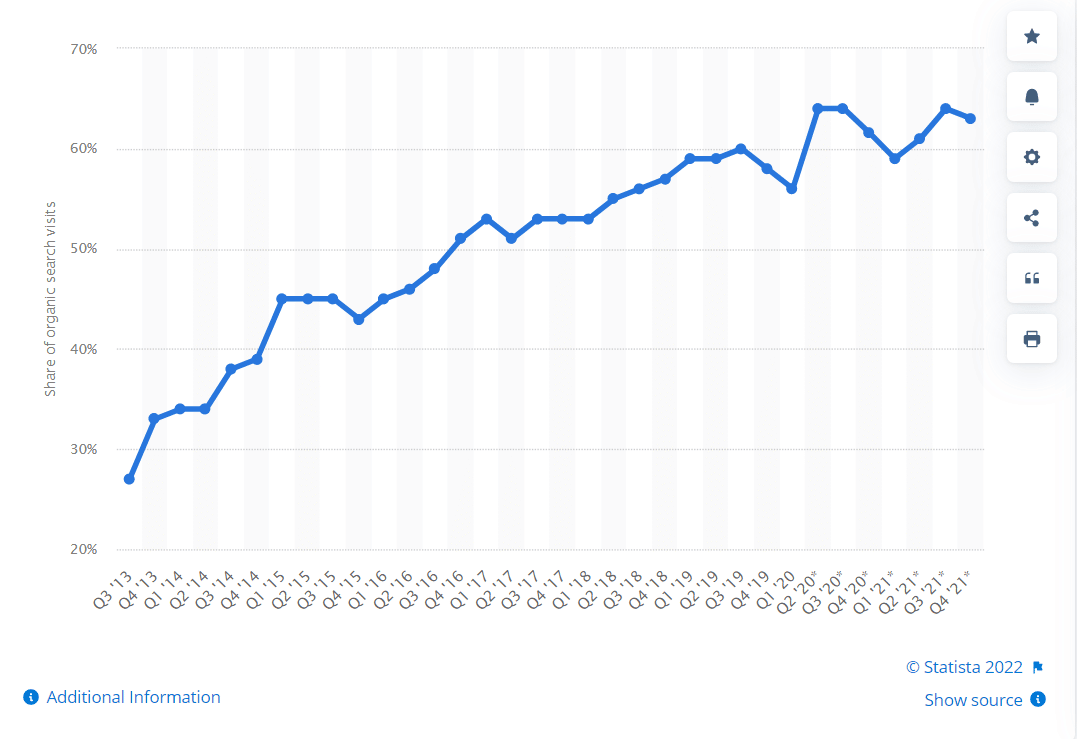
Sources: Statcounter, Insider Intelligence, Statista2
How many internet searches are there per day?
There are at least 10 billion internet searches every day, and at least 3.65 billion internet searches per year.
Note: The exact number of internet searches per day is unknown as many search engines don’t release their usage data to the public. The figure above is a calculation based on the estimated number of Google searches per day and Google’s market share.
How many Google searches are there per day?
According to our calculations, there are around 9.3 billion Google searches per day, 279 billion Google searches per month, and 3.4 trillion Google searches yearly.
To put that into perspective, every person on earth would have to search Google around 1.3 times per day to reach that figure.
Note: Google doesn’t officially publish its search data, so the above figures are rough estimations. They were extrapolated from the latest Worldometers data, which keeps a running total of the number of Google searches of the current year to date.
How many Bing searches are there per day?
There are around 400 million Bing searches per day, 12 billion Bing searches per month, and 144 billion Bing searches per year. This is according to the latest available data on Statista from August 2017.
How many DuckDuckGo searches are there per day?
There were around 96.4 million DuckDuckGo searches per day in November 2022. That works out to around 2.9 billion searches per month, and 35.2 billion searches per year.
Interestingly, DuckDuckGo’s average daily searches have been falling over the last year and are down significantly compared to January, when there were over 106 million daily average searches.
Sources: Worldometer, DuckDuckGo, Statista4
What was the first web search engine?
ALIWEB Is widely considered to be the first web search engine. It was announced in November, 1993.
While it’s true that a few search engines predated ALIWEB (like Gopher, Archie, Veronica, etc), all of these predecessors were built with different purposes or were only indexers. They weren’t true web search engines.
That said, ALIWEB was not very widely used, as it relied on people submitting the locations of index files on their sites, and relatively few people did this.
The first popular web search engine that was widely used was Yahoo! Search. Yahoo! Directory was founded in January 1994, and the search engine was added in 1995.
Sources: Nexor
Search engine query statistics
Next, let’s look at some statistics that tell us more about the most popular keywords that search engine users search for.
Top trending search engine queries (2021)
According to Google Trends data, these search terms had the highest spike in search traffic in 2021 compared to the year before, globally.
- Australia vs India
- India vs England
- IPL
- NBA
- Euro 2021
- Copa America
- India vs New Zealand
- T20 World Cup
- Squid Game
- DMX
These trending search queries provide us with an interesting snapshot of the year’s biggest highlights and most significant world events. As you can see, they’re pretty much all sport related with the exception of Squid Game—the hit Korean Netflix show.
Top trending news-related search engine queries (2021)
- Afghanistan
- AMC Stock
- COVID Vaccine
- Dogecoin
- GME Stock
- Stimulus Check
- Georgia Senate Race
- Hurricane Ida
- COVID
- Ethereum Price
What is the most popular Google search query?
The most popular Google search query in 2022 is Facebook, with over 203.9 million searches to date.
Top 10 Google searches globally (2022):
- Facebook – 203.9m searches
- YouTube – 196.1m searches
- Amazon – 178.2m searches
- Wordle – 159.1m searches
- Google – 128.5m searches
- Gmail – 100.3m searches
- BBC News – 67.7m searches
- Google Translate – 62.2m searches
- Weather – 61.4m searches
- Yahoo mail – 56.6m searches
What is the most popular Bing search?
Hilariously, the most popular search on Bing is for its biggest rival. ‘Google’ was searched 44.4 million times as of July 2019, making it the most common search query.
This may be because many Bing users would prefer to use Google but aren’t sure how to switch their default search engine.
Top 5 Bing searches globally (2022):
- Google – 44.4 million searches
- YouTube – 33.3 million searches
- Facebook – 31.2 million searches
- Gmail – 15.8 million searches
- How to get help in Windows 10 – 12.3 million searches
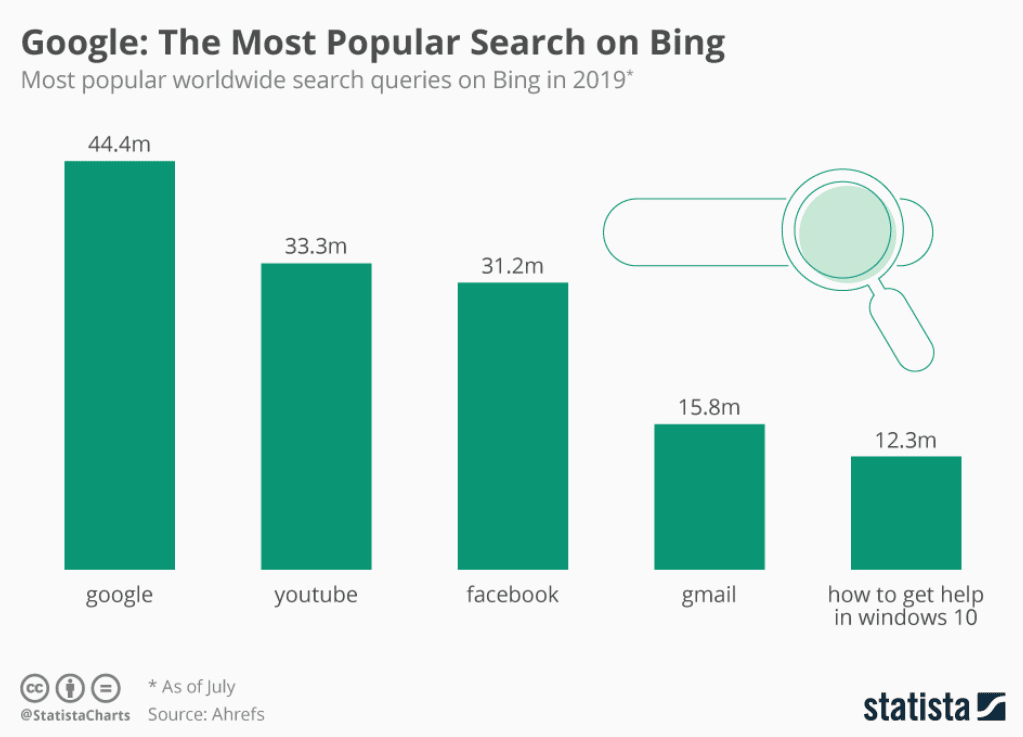
Other interesting search engine query statistics:
- 91.8% of search queries are long tail keywords, but these account for only 3.3% of total search volume.
- The top 500 most popular search terms account for 8.4% of all searches. And the top 2000 make up 12.2% of all searches
- The average keyword search volume is 989. But the median search volume is just 10.
- 14.1% of search queries are question searches.
- The most common question word used in searches is ‘how’ (8.07%), followers by what (3.4%), where (0.88%), why (0.82%), who (0.6%), and which (0.33%)
- Keywords with 5+ words are searched 10x less than those that are 1-3 words

Source: Semrush, Google Trends, Statista5, Backlinko
Misc. search engine statistics
Before we wrap up, let’s take a look at some more search engine statistics that didn’t fit in any other section of this article, but that we still think are super interesting.
How much is spent on search engine advertisements?
Around $164.6 billion is spent on search advertising globally as of 2022. Until 2021, this searched the top internet channel by advertising spend. But this year, it was surpassed by social media (which accounts for 187 billion in advertising spend).
What’s the average cost-per-click (CPC) of Google Ads?
The average CPC of a keyword on Google Ads is $0.61. This is a good benchmark to measure your own paid ad campaigns against, but remember that CPC varies substantially depending on how competitive the search terms you’re targeting are.
Why do users switch search engines?
According to a survey from 2019, the main factor that would motivate people to switch search engines is if the alternative offered superior quality results.
Top reasons users would switch search engines (% of total responses):
- Better quality of results – 40.7%
- No personal data collection (increased privacy) – 28.2%
- Fewer ads – 18.6%
- Better visual design – 5.1%
- Options to search everywhere – 4.4%
- Customizable layout and colors – 3%
How common are SERP features?
97.6% of Google searches bring up pages with at least one SERP feature.
If you didn’t already know, SERP features are results that appear on the search engine results pages (SERPs) that aren’t traditional organic or paid results. They’re a relatively new format changing how users interact with results pages.
What are the most common SERP features?
The most common SERP features to appear in the results pages are the People Also Ask box and Image Pack features:
- Image pack – 19.4%
- People Also Ask – 19.4%
- Video thumbnails – 17.9%
- Top Stories – 15.4%
- Sitelinks – 11%
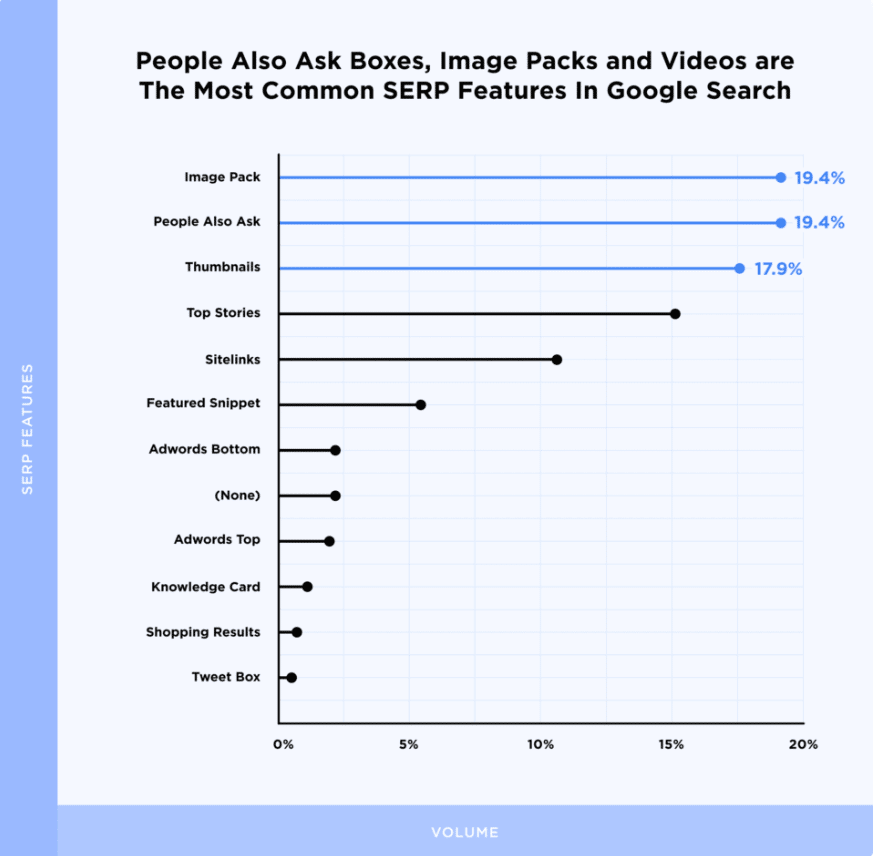
How many Google searches end in a click?
Nearly two-thirds of all Google searches result in no clicks:
- 64.82% zero-click searches
- 33.59% organic click searches
- 1.59% paid click searches
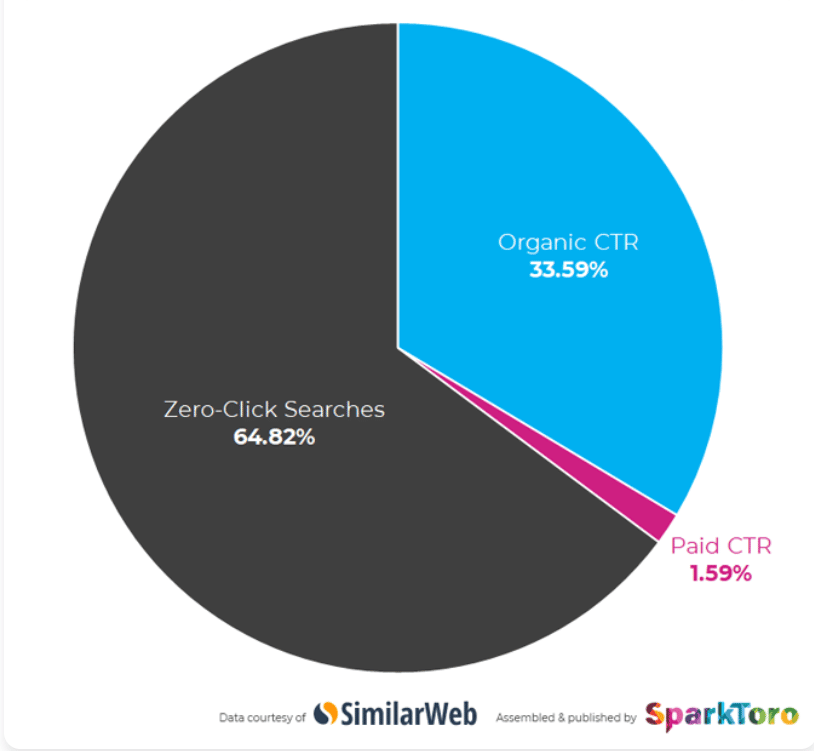
This is based on analysis by SparkToro using data available through SimilarWeb. Notably, the figure is up on previous estimates (one study in 2019 had it closer to 50%).
This increase may be due to the accelerating rollout of Google’s featured snippets, which give users answers without them having to click the page. Other zero-click searches may result from people searching for directions or images and not having to click on anything.
Source: Statista1, Backlinko, Statista3 , SparkToro
Final thoughts
That concludes our roundup of search engine statistics. We hope you found them useful.#
Here are some of the key takeaways:
- Google continues to dominate the search engine landscape and likely will do for the foreseeable future.
- Mobile search has overtaken desktop and is now the most common device people use when interacting with search engines
- There are trillions of searches every year and search engines continue to be a fundamental part of the web, generating more visits than any other type of website
Still hungry for knowledge? Check out these awesome social media statistics.

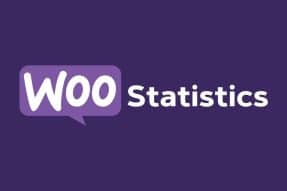





This Post Has 0 Comments